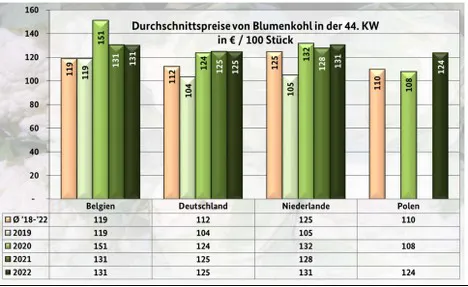Domestic cauliflower shipments dominated the market in terms of importance, with Belgian lots coming second. Shipments from the Netherlands and Poland did have more than a supplementary character. According to the BLE, the first French products appeared in Munich, but they were quite expensive and this meant they garnered little attention.
There were violet and pale orange products from Belgium as well, but their turnover was slow due to high pricing. Overall, demand was generally met. In order to speed up business, distributors reduced their prices in certain areas. In Hamburg, however, demand could not be fully met, which is why sellers increased their prices.

Apples
Due to the holidays at the beginning of the week, demand was initially very limited. This changed on several occasions from Wednesday onwards, with sales improving in places. In the meantime, several markets also offered Fräulein, which were handled loose. In Hamburg, they started the campaign at 1.30 € per kg.
Pears
Sales were quite slow. Abate Fetel, Santa Maria and Williams Christ from Italy formed the basis of the product range. Turkish Santa Maria played a larger role, Belgian Conference only a small one. Domestic Conference, Alexander Lucas and Gute Luise rounded out the stores as did Dutch Gute Luise and Conference.
Table grapes
Italian deliveries predominated: Italia, Crimson Seedless, Michele Palieri and Red Globe dominated the scene. From Turkey, Sultana was the main grape variety, and its organoleptic characteristics were quite convincing. In Frankfurt, the first Autumn Crisp from Peru appeared, thus opening the campaign of overseas imports.
Small citrus fruits
Somewhat lower temperatures had a positive effect on demand here and there. Nevertheless, there was simply too much product available, as deliveries had expanded massively. Spanish clementines, in particular, greatly expanded their presence, but Italian items also gained in importance. Turkish satsumas were a new addition to the range.
Lemons
The assortment consisted primarily of Spanish and Turkish offloads. Their importance obviously increased. By contrast, lots from South Africa had almost completely disappeared from the range. A few Greek batches rounded off the product range. Business was mixed.
Bananas
Supply and demand were sufficiently matched. As a result, traders rarely had cause to modify their previous prices. However, demand had weakened somewhat in some areas, so slight reductions were put in place to speed up business.
Lettuces
Regarding lettuces, customers could access Belgian and domestic goods. A few Italian imports arrived in Munich, but these saw little interest from customers. Meanwhile, as far as iceberg lettuce went, it was Spanish deliveries that had central stage. Domestic and Dutch batches only played a minor role.
Cucumbers
The season for domestic items was entering the home stretch. In some areas, it ended during the week. The quality was no longer consistently convincing and deliveries obviously died down. Belgian and Dutch products also lost ground. Spanish shipments, on the other hand, expanded.
Tomatoes
The supply was primarily composed of Dutch, Belgian and Turkish batches. Morocco was also presented with some goods, especially with regard to beef tomatoes and round tomatoes. Spanish TOVs lacked the right coloration in Frankfurt, generating little demand.
Sweet peppers
The presence of Spanish and Turkish offerings expanded. The Central European campaign, meanwhile, was nearing completion, with imports from the Netherlands, Belgium and Germany diminishing. Polish imports also slowed down. The demand could not be satisfied across the board.
Source: BLE
